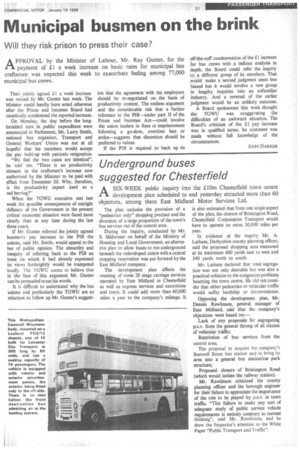Municipal busmen on the brink
Page 33

If you've noticed an error in this article please click here to report it so we can fix it.
Will they risk prison to press their case?
APPROVAL by the Minister of Labour, Mr. Ray Gunter, for the payment of £1 a week increase on basic rates for municipal bus craftsmen was expected this week to exacerbate feeling among 77,000 municipal bus crews.
Their jointly agreed £1 a week increase was vetoed by Mr. Gunter last week. The Minister could hardly have acted otherwise after the Prices and Incomes Board had caustically condemned the reported increase.
On Monday, the day before the longheralded cuts in public expenditure were announced in Parliament, Mr. Larry Smith, national bus organizer, Transport and General Workers' Union was not at all hopeful that his members would accept the pay hold-up with patriotic resignation "We feel the two cases are identical", he told me. "There is no productivity element in the craftsmen's increase now authorized by the Minister to be paid with effect from December 20. Why, therefore, is the productivity aspect used as a red herring?"
When the TGWU executive met last week the possible consequences of outright defiance of the Government in the present critical economic situation were faced more clearly than at any time during the last three years.
If Mr. Gunter referred the jointly agreed busmen's pay increase to the PIB the unions, said Mr. Smith, would appeal to the bar of public opinion. The absurdity and inequity of referring back to the PIB an issue on which it had already expressed its views forthrightly would be trumpeted loudly. The TGWU seems to believe that in the face of this argument Mr. Gunter can be persuaded to eat his words.
It is difficult to understand why the bus unions and particularly the TGWU are so reluctant to follow up Mr. Gunter's suggest ion that the agreement with the employers should be re-negotiated on the basis of productivity content. The endless argument and the considerable risk that a further reference to the PIB—under part II of the Prices and Incomes Act—could involve the union leaders in fines or imprisonment following a go-slow, overtime ban or strike—suggests that discretion should be preferred to valour.
If the PIB is required to back up its off-the-cuff condemnation of the £1 increase for bus crews with a tedious analysis in depth, the Board could refer the inquiry to a different group of its members. That _would make a second judgment seem less biased but it would involve a new group in lengthy inquiries into an unfamiliar industry. And a reversal of the earlier judgment would be an unlikely outcome.
A Board spokesman this week thought the TGWU was exaggerating the difficulties of an awkward situation. The Board's criticism of the £1 pay increase was in qualified terms. Its comment was made without full knowledge of the circumstances.
JOHN DARKER




















































































































